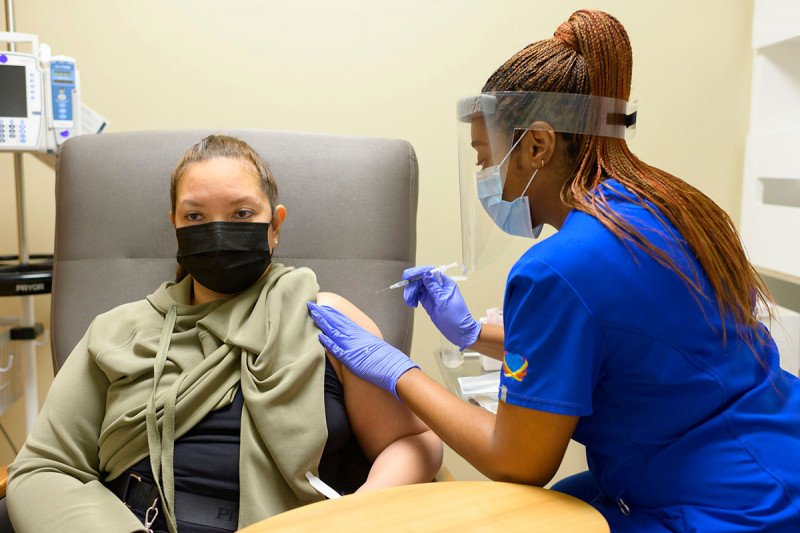
Most people with cancer who were previously vaccinated require only 1 dose of the new vaccine at this time. You can consider getting a second dose 2 months later, after talking with your doctor.
Memorial Sloan Kettering Cancer Center (MSK) and the Centers for Disease Control and Prevention (CDC) recommend people with cancer stay up to date on their COVID-19 vaccinations.
If you have cancer, you may have a weakened immune system (called immunocompromised). This can put you at higher risk for severe COVID-19. Protecting yourself from COVID-19, including getting vaccinated, is very important.
Mini Kamboj, MSK’s Chief Medical Epidemiologist, explains what you need to know about COVID-19 vaccines if you’ve had cancer.
This information is for people with weakened immune systems (called immunocompromised).
If you are not immunocompromised, please visit the CDC’s website for information about how many vaccine doses you should receive and when:
What to Know about the 2023-2024 COVID-19 Vaccine
There is a new COVID-19 vaccine (shot) that is available in the U.S. This vaccine targets the variants that are now circulating and are expected to spread in the fall and winter seasons.
Everyone age 6 months and older is eligible to get the 2023-2024 COVID-19 vaccine. If it’s been 2 months since your most recent COVID-19 vaccination or since you were infected with COVID-19, you should get the shot.
MSK recommends that all our patients get vaccinated as soon as they are eligible.
Most people with cancer who were previously vaccinated require only 1 dose of the new vaccine at this time. You can consider getting a second dose 2 months later, after talking with your doctor.
Who Is At Risk for Severe COVID-19
The CDC says that people who are “moderately to severely immunocompromised” are at increased risk of severe COVID-19 illness.
This includes:
- People with blood cancer.
- People who are actively being treated for solid tumors with chemotherapy — and some people being treated with immunotherapy.
- People without a functioning spleen (called asplenia).
- People who have undergone a stem cell transplant or received CAR T therapy within the past two years.
- People who are actively being treated for graft-versus-host-disease (GVHD) with immunosuppressive drugs (for example, sirolimus or Rapamune®).
- People with primary immunodeficiency disorders (for example, DiGeorge syndrome, Wiskott-Aldrich syndrome).
- People with active or untreated HIV infection.
- People actively using high-dose steroids (for example, 20mg of prednisone or more per day for at least 2 weeks).
- People actively being treated for an immune-related disease (for example, rheumatoid arthritis, Crohn’s disease, or psoriasis) with a tumor necrosis factor (TNF) inhibitor (for example, adalimumab or Humira®).
These eligibility criteria cover the most common situations. If you are receiving another treatment that has weakened your immune system, your doctor will be able to advise you about getting the COVID-19 vaccine.
Revaccination After Certain Treatments
Certain cancer treatments can completely or partially wipe out a patient’s immune system. Because of this, anything that your immune system learned before cancer treatment now may be completely gone. Your immune system needs to relearn how to fight COVID-19.
If you received any COVID-19 shots before, during, or shortly after cancer treatment, you may need to be revaccinated if your doctor thinks your immune system has recovered enough to respond to the vaccines.
Everyone who is currently eligible to be vaccinated is also eligible to be revaccinated if they received any of these treatments:
- Hematopoietic cell transplantation (also called a bone marrow transplantation or stem cell transplantation)
- CAR T therapy
- Treatment with B cell depleting drugs such as rituximab (Rituxan®)
Your healthcare team will determine whether you should be revaccinated and the best time to get the shots. Only healthcare providers can order revaccination for their patients after careful evaluation of eligibility. If you think you meet any of the criteria for revaccination, you should talk to your healthcare team.
How Else to Protect Yourself from COVID-19
Even when you are completely up to date on your COVID-19 shots, you must still take certain precautions to protect yourself and your loved ones from COVID-19. You should:
- Wear a mask indoors and outdoors when you are around anyone you don’t live with.
- Wash your hands frequently for at least 20 seconds.
- Stay 6 feet apart from others you don’t live with.
- Avoid crowds and indoor spaces that are poorly ventilated.
- Encourage your close friends, family members, neighbors, and co-workers to be vaccinated.
- If you develop symptoms of COVID-19, contact your MSK care team and get tested.
How to Get a COVID-19 Vaccine
Starting October 2, we can vaccinate our patients aged 12 and older during their appointment. During your appointment, tell your care team that you want to get the COVID-19 vaccine.
If you don’t have an upcoming MSK appointment or if you don’t want to wait to get your shot at MSK, you can use these websites to get a vaccine somewhere else:
October 2, 2023

